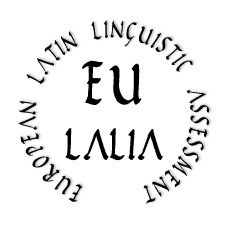
Unibo structure involved: Department of Classical Philology and Italian Studies - FICLIT
Scientific manager: Lucia Pasetti
Unibo Team: Francesca Magrefi, Barbara Vetturini, Daniele Pellacani, Chiara Gianollo
Project Web page: https://site.unibo.it/eulalia/en
Erasmus+ Action type: Strategic Partnerships for higher education
Project reference: 2019-1-IT02-KA203-062286
Start Date: 15 October 2019
End Date: 14 October 2022 (end date postponed due to Covid-19)
Budget: Total € 332,535 - UNIBO € 73,866
Coordinator: ALMA MATER STUDIORUM – UNIVERSITÀ DI BOLOGNA (IT)
Partners:
UNIVERSITÀ CATTOLICA DEL SACRO CUORE (IT)
UNIVERSITE DE ROUEN NORMANDIE (FR)
UNIVERSIDAD DE SALAMANCA (ES)
UNIVERSITÄT ZU KÖLN (DE)
UPPSALA UNIVERSITET (SE)
Summary
The EULALIA project (European Latin Linguistic Assessment) is aimed at developing a comprehensive framework for the international certification of linguistic competences in Latin, following the model set by CEFR for modern languages.
In Europe more than 3 million students in secondary schools study Latin. At university level, Latin figures in many curricula, but the linguistic competence required from students can vary substantially across programmes (also within the same country). Just considering the partner university institutions, 9000 students will study Latin at BA Level for the duration (30 months) of this project. Difference in linguistic education ends up having negative consequences for ERASMUS exchange students, since the ECTS system is not sufficient in itself to guide them in their choice of courses at the host institution. There is therefore a strong need for homogeneity and transparency in recognition of skills and qualifications, in order to facilitate internationalisation and Europe-wide student mobility in the framework of programmes such as ERASMUS. Teaching Latin also faces further challenges due to ongoing changes in contemporary society, and has to renew its methods by adopting open and innovative practices supported by multimedia digital technologies. There is evidence that this will favour the inclusion of categories such as students with special needs (visually impaired, individuals with learning disabilities) and students who, due to recent immigration, are not native speakers of the
language of education in their new home countries.
EULALIA creates an international framework for certification of Latin language competences, and designs teaching activities that will be needed to develop the competences to be certified. The project will implement two different levels of multimedia certification tool-kits (one for the Basic and one for the Advanced Level) including a syllabus, a lexicon and a collection of exercises, which will be the product of the expertise of the involved partners. The design of the tool-kits will follow a multimedia approach: all textual input will be accompanied by audio tools, with the aim of strengthening the role of the auditory channel in teaching Latin in order to assist the number of learners with special needs. These comprehensive tool-kits, together with the certification tests, will be made available on an open access digital multimedia platform. This way, the involved institutions will collaborate in defining a genuinely European certification model, which is as respectful as possible of differences, open, inclusive and usable across all teaching levels (secondary school and higher education).
EULALIA will be the work of a transnational partnership composed of 6 universities: the University of Bologna, the University of Cologne, the University of Rouen Normandie, the University of Salamanca, the Università Cattolica del Sacro Cuore (Brescia), the University of Uppsala, thus involving 5 European countries. All these institutions have a long tradition of excellent scholarship and teaching Latin, as well as expertise in digital humanities, teaching of modern languages and pedagogical strategies regarding special needs.
EULALIA is addressed at various target groups: university students, students at secondary school, lecturers and teachers of Latin, both at university and secondary school. Stakeholders are represented in our partnership by scientific associations and educational offices, fostering the study of Latin and monitoring the certification activities of some local pioneering experiments. In cooperation with the stakeholders EULALIA aims at producing an active impact on educational policies in a national, European and extra-EU context. In order to reach this goal, the elaboration of a certification framework needs to be addressed at a transnational level.
The project is articulated in two macro-phases, the first aimed at the elaboration of the theoretical guidelines, at the design of the multimedia tools, and at the creation and testing of a certification model for the basic level, together with the appropriate tool-kit. In the second macro-phase the work will be extended to the advanced competence level, and the multimedia tools will be further implemented. Besides the production of the relevant outputs, activities within the project include transnational project meetings, international multiplier events involving teachers and other stakeholders, a transnational learning activity, and a number of measures to extend our network and actively involve policy makers. While the short-term impact is mainly linked to participants in the project, the main actors engaged in the long-term impact of the project results will in fact include educational systems at a local, regional, and national level, in order to ensure that the certification framework becomes widely adopted in Europe and, thus sustainable well beyond the limits of this project.
